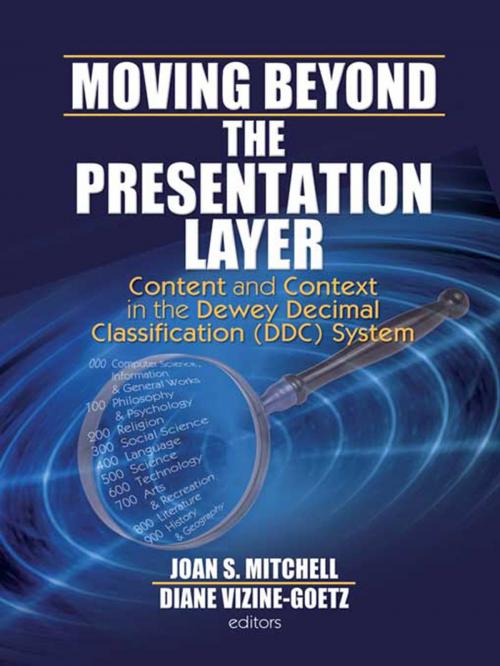Moving Beyond the Presentation Layer
Content and Context in the Dewey Decimal Classification (DDC) System
Nonfiction, Reference & Language, Language Arts, Library & Information Services| Author: | ISBN: | 9781136454073 | |
| Publisher: | Taylor and Francis | Publication: | May 13, 2013 |
| Imprint: | Routledge | Language: | English |
| Author: | |
| ISBN: | 9781136454073 |
| Publisher: | Taylor and Francis |
| Publication: | May 13, 2013 |
| Imprint: | Routledge |
| Language: | English |
Can the Dewey Decimal System meet the needs of the rapidly changing information environment?
Moving Beyond the Presentation Layer explores the Dewey Decimal System from a variety of perspectives, each of which peels away a bit of the presentation layer-the familiar linear notational sequence-to reveal the content and context offered by the DDS. Library professionals from around the word examine how the content and context offered by the DDS can evolve to meet the needs of the changing information environment, with a special focus on the impact of the Internet on current and future developments.
Moving Beyond the Presentation Layer examines whether the Dewey Decimal System is a rigid structure best suited to a physical information environment or a polymorphic one that can be adapted to meet a variety of physical and virtual needs. This unique book reviews the 40-year history of the online use of classification systems, the development of the Relative Index over 22 editions of the DDC, recommendations to ensure the viability of the DDC in a time of mass digitization, using DDS in an environment where it hasn’t been used before, teaching the DDS, special issues related to the use of the DDS in Europe, North America, and Africa, and the future of online classification.
Topics examined in Moving Beyond the Presentation Layer include:
-
using the DDC as the browsing mechanism for resource discovery
-
classification as an online cataloging tool
-
classification as an online end-user tool
-
browser behavior in a DDC-based Web service
-
the role of the DDS in the ongoing HILT (High-Level Thesaurus) project
-
using the DDS to organize Web resources
-
localization and interoperability in knowledge organization
-
mapping terminologies to classification systems
-
the DeweyBrowser
-
and much more
Moving Beyond the Presentation Layer is an essential professional resource for librarians, information scientists, computer scientists, and metadata and Web services specialists.
Can the Dewey Decimal System meet the needs of the rapidly changing information environment?
Moving Beyond the Presentation Layer explores the Dewey Decimal System from a variety of perspectives, each of which peels away a bit of the presentation layer-the familiar linear notational sequence-to reveal the content and context offered by the DDS. Library professionals from around the word examine how the content and context offered by the DDS can evolve to meet the needs of the changing information environment, with a special focus on the impact of the Internet on current and future developments.
Moving Beyond the Presentation Layer examines whether the Dewey Decimal System is a rigid structure best suited to a physical information environment or a polymorphic one that can be adapted to meet a variety of physical and virtual needs. This unique book reviews the 40-year history of the online use of classification systems, the development of the Relative Index over 22 editions of the DDC, recommendations to ensure the viability of the DDC in a time of mass digitization, using DDS in an environment where it hasn’t been used before, teaching the DDS, special issues related to the use of the DDS in Europe, North America, and Africa, and the future of online classification.
Topics examined in Moving Beyond the Presentation Layer include:
-
using the DDC as the browsing mechanism for resource discovery
-
classification as an online cataloging tool
-
classification as an online end-user tool
-
browser behavior in a DDC-based Web service
-
the role of the DDS in the ongoing HILT (High-Level Thesaurus) project
-
using the DDS to organize Web resources
-
localization and interoperability in knowledge organization
-
mapping terminologies to classification systems
-
the DeweyBrowser
-
and much more
Moving Beyond the Presentation Layer is an essential professional resource for librarians, information scientists, computer scientists, and metadata and Web services specialists.















